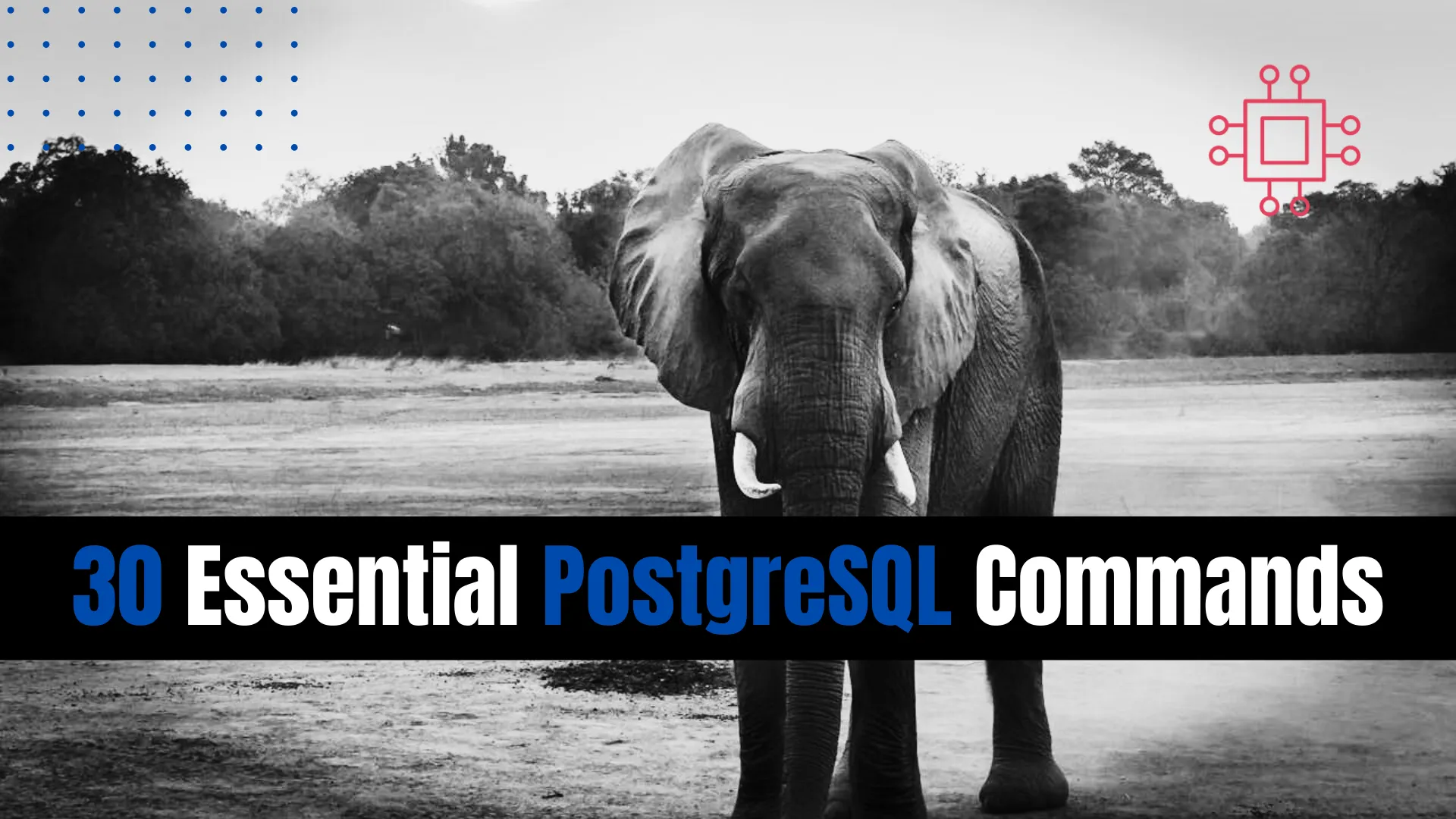
Discover 30 essential PostgreSQL commands to enhance your database management skills. This comprehensive guide covers key commands, examples, and tips for efficient PostgreSQL use. Perfect
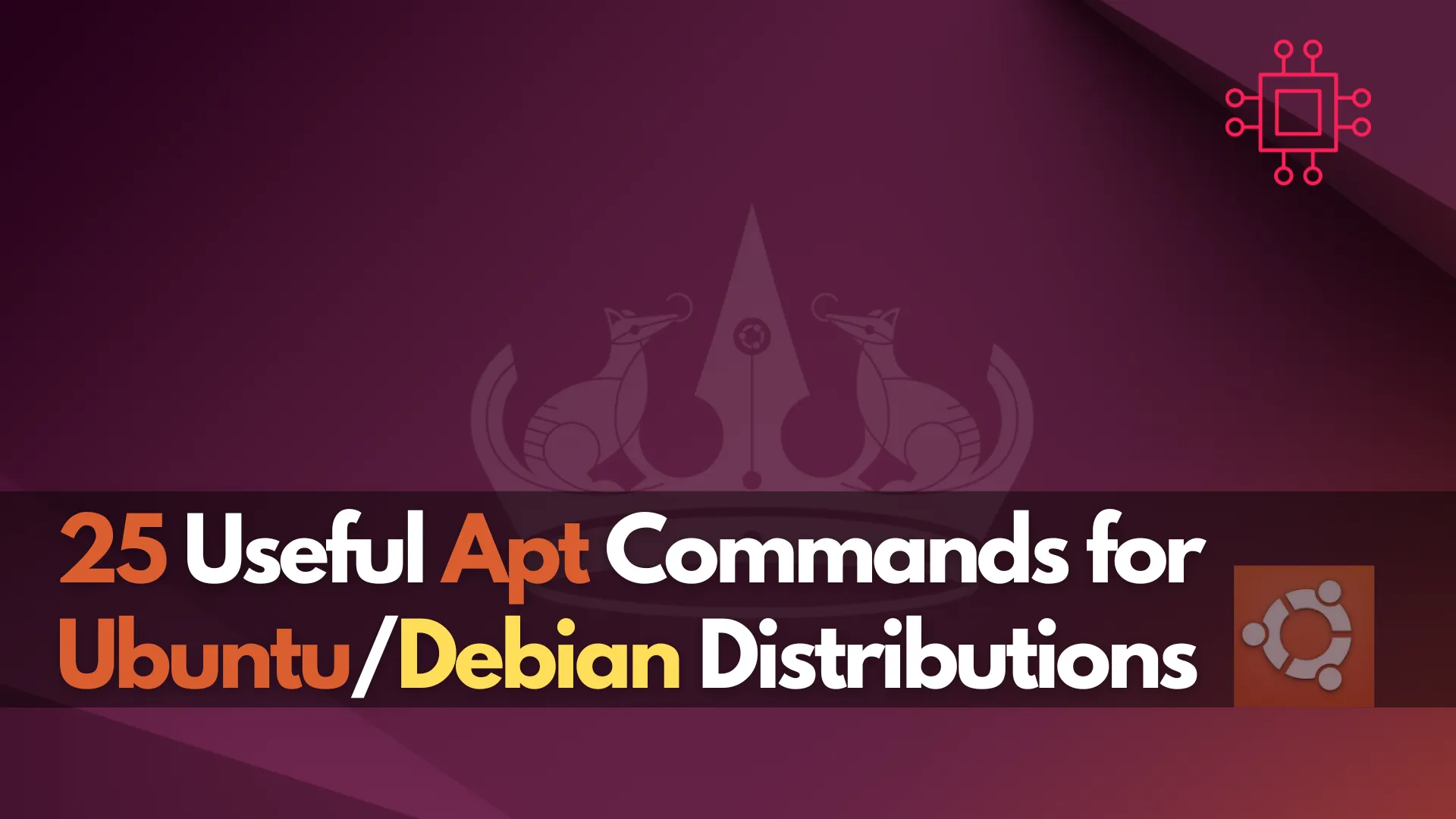
Discover 25 essential apt commands for Ubuntu and Debian distributions to manage packages, perform upgrades, and maintain a clean system. Boost your efficiency and productivity today!
If you’re an Ubuntu or Debian user, you’ve probably encountered apt commands in your terminal. The apt (Advanced Package Tool) is the backbone of package management for both Ubuntu and Debian-based Linux distributions. It helps users install, remove, upgrade, and manage software packages effortlessly.
Whether you’re a beginner or a seasoned system administrator, mastering apt commands can streamline your workflow, saving you time and preventing errors. This blog post will walk you through 25 useful apt commands that can supercharge your productivity and make package management a breeze. From installing software to cleaning up your system, these commands will help you harness the full power of your Ubuntu or Debian system.
1. |
This command refreshes the local repository index, ensuring that your package manager is aware of the latest versions of packages and dependencies.
sudo apt update
Before installing or upgrading any software, it’s important to update the package list. This ensures that you’re working with the most recent version available from the repositories.
2. |
This command upgrades all the outdated packages on your system to their latest available versions.
sudo apt upgrade
Use apt upgrade to ensure your system is running the latest versions of packages. This is ideal for routine maintenance and security updates.
3. |
Unlike apt upgrade, this command can remove or install new packages to complete the upgrade process, ensuring the system is fully upgraded.
sudo apt full-upgrade
A full-upgrade is useful when you need to perform a major upgrade that requires removing obsolete packages or installing new dependencies.
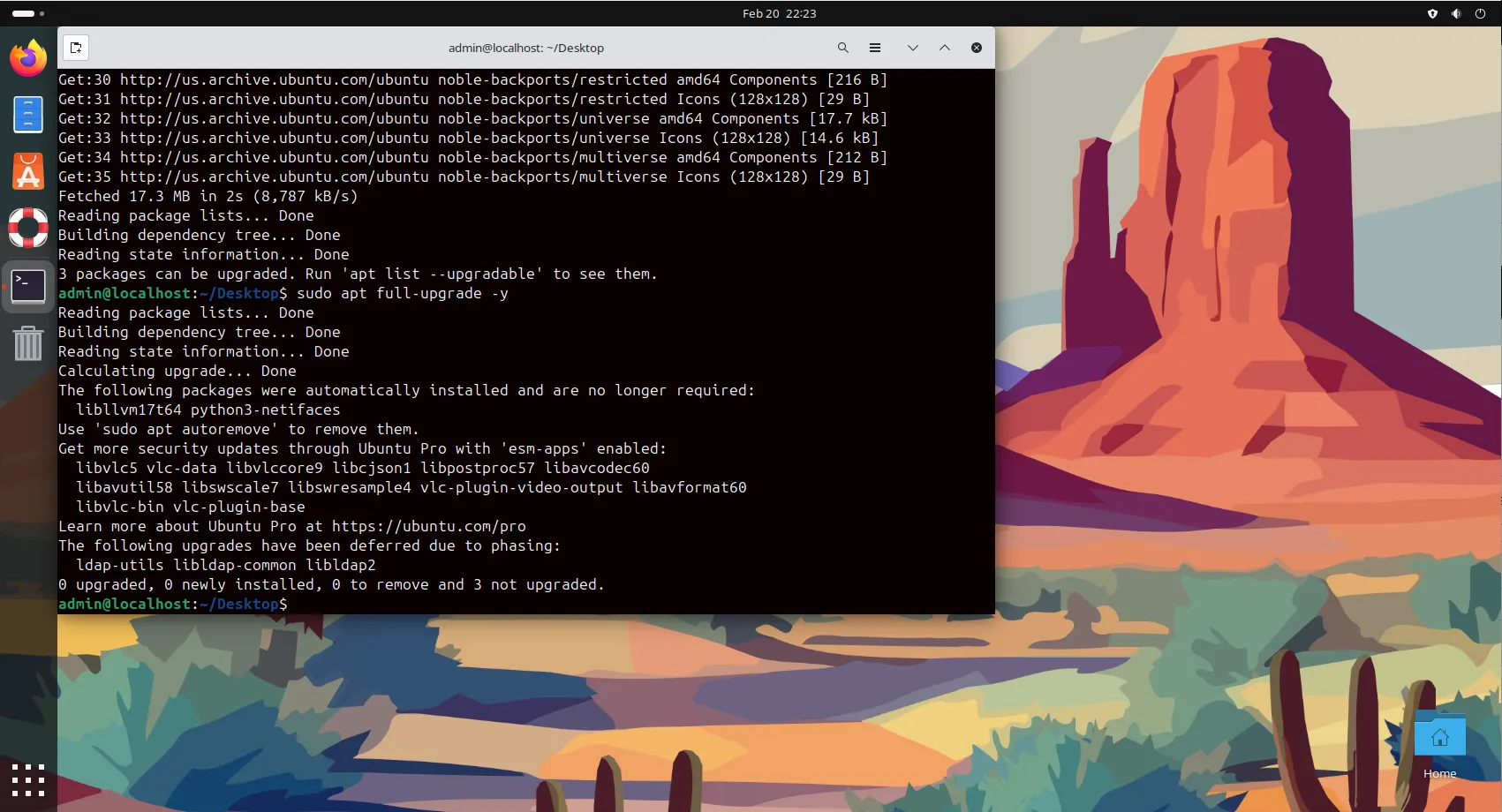
Photo by admingeek from Infotechys
4. |
Installs a specific package or application.
sudo apt install chromium-browser
If you want to install a software package, replace package_name with the name of the software you wish to install. For instance, chromium installs the Chromium browser.

Photo by admingeek from Infotechys
5. |
Removes a specific package from your system.
sudo apt remove chromium-browser
This command will remove the package but leave its configuration files intact. If you want to completely remove a package, including configuration files, use apt purge.
6. |
Completely removes a package, including configuration files.
sudo apt purge chromium-browser
This is ideal when you want to uninstall a package completely, leaving no trace of configuration files on your system.
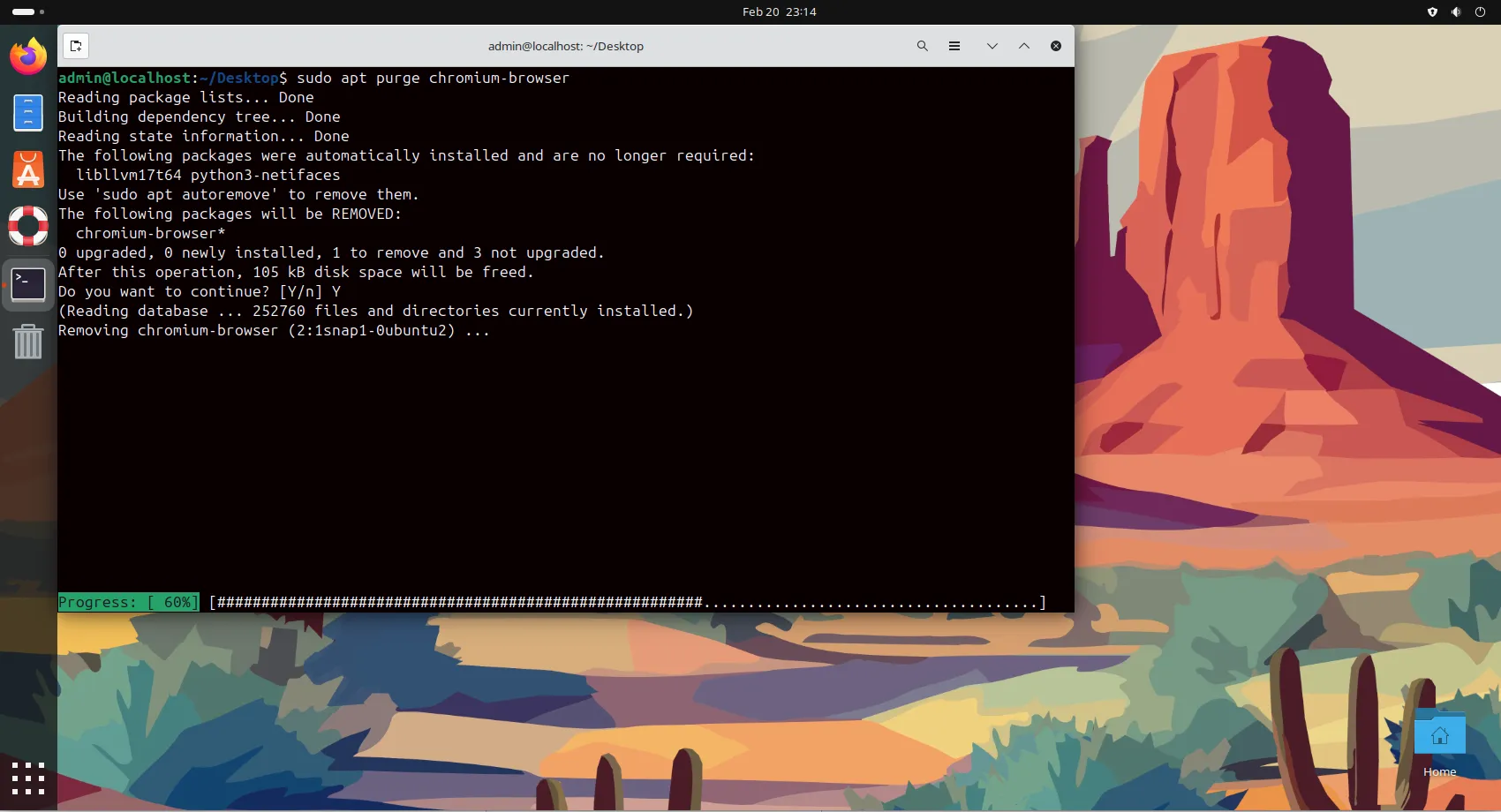
Photo by admingeek from Infotechys
7. |
Removes unnecessary packages and dependencies that were installed as dependencies but are no longer needed.
sudo apt autoremove
Over time, your system may accumulate unused libraries or packages. Running this command regularly helps keep your system clean.
8. |
Searches for a package in the repository.
sudo apt search vlc
This command allows you to search the package repositories for available packages. It’s a great way to discover new software or check if a package is available for installation.
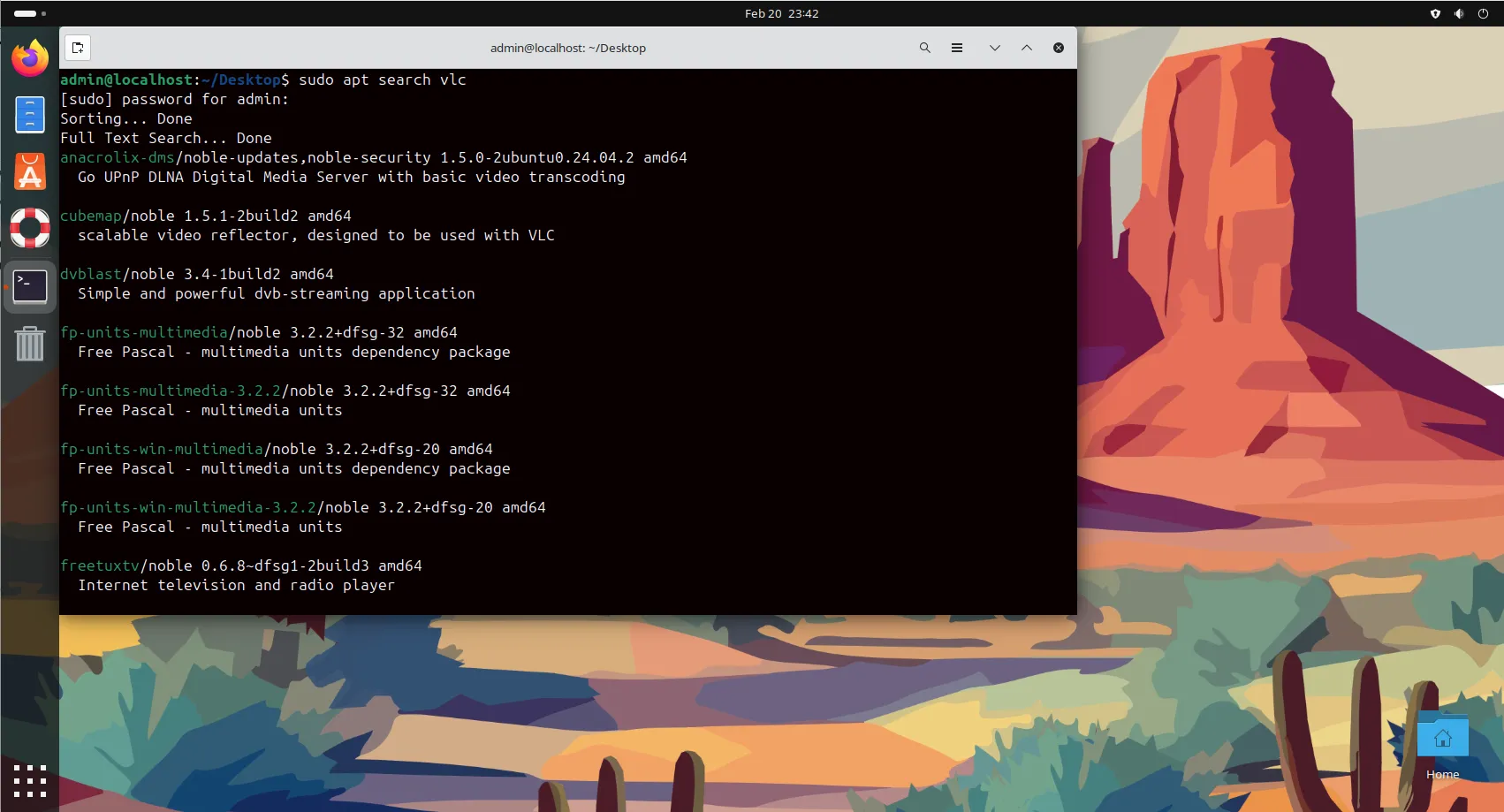
Photo by admingeek from Infotechys
9. |
Provides detailed information about a specific package, including its description, version, and dependencies.
sudo apt show vlc
Package: vlc
Version: 3.0.20-3build6
Priority: optional
Section: universe/graphics
Origin: Ubuntu
Maintainer: Ubuntu Developers <ubuntu-devel-discuss@lists.ubuntu.com>
Original-Maintainer: Debian Multimedia Maintainers <debian-multimedia@lists.debian.org>
Bugs: https://bugs.launchpad.net/ubuntu/+filebug
Installed-Size: 200 kB
Provides: mp3-decoder
Depends: vlc-bin (= 3.0.20-3build6), vlc-plugin-base (= 3.0.20-3build6), vlc-plugin-qt (= 3.0.20-3build6), vlc-plugin-video-output (= 3.0.20-3build6)
Recommends: vlc-l10n (= 3.0.20-3build6), vlc-plugin-access-extra (= 3.0.20-3build6), vlc-plugin-notify (= 3.0.20-3build6), vlc-plugin-samba (= 3.0.20-3build6), vlc-plugin-skins2 (= 3.0.20-3build6), vlc-plugin-video-splitter (= 3.0.20-3build6), vlc-
...omitted for brevity...
Use this to get more information about a package before installation. It provides details such as the package’s version, description, and its dependencies.
10. |
Lists all installed packages on your system.
apt list --installed
Listing... Done
accountsservice/noble,now 23.13.9-2ubuntu6 amd64 [installed,automatic]
acl/noble-updates,now 2.3.2-1build1.1 amd64 [installed,automatic]
adduser/noble,now 3.137ubuntu1 all [installed,automatic]
adwaita-icon-theme/noble,now 46.0-1 all [installed,automatic]
aha/noble,now 0.5.1-3build1 amd64 [installed,automatic]
alsa-base/noble,now 1.0.25+dfsg-0ubuntu7 all [installed,automatic]
alsa-topology-conf/noble,now 1.2.5.1-2 all [installed,automatic]
alsa-ucm-conf/noble-updates,now 1.2.10-1ubuntu5.4 all [installed,automatic]
alsa-utils/noble,now 1.2.9-1ubuntu5 amd64 [installed,automatic]
amd64-microcode/noble-updates,noble-security,now 3.20231019.1ubuntu2.1 amd64 [installed,automatic]
anacron/noble,now 2.3-39ubuntu2 amd64 [installed,automatic]
apg/noble,now 2.2.3.dfsg.1-5build3 amd64 [installed,automatic]
apparmor/noble-updates,now 4.0.1really4.0.1-0ubuntu0.24.04.3 amd64 [installed,automatic]
appmenu-gtk-module-common/noble,now 0.7.6-2.1ubuntu2 all [installed,automatic]
appmenu-gtk3-module/noble,now 0.7.6-2.1ubuntu2 amd64 [installed,automatic]
...omitted for brevity...
This command provides a comprehensive list of all the installed packages on your system, useful for audits or troubleshooting.
11. |
apt list --upgradable
Listing... Done
ldap-utils/noble-updates 2.6.7+dfsg-1~exp1ubuntu8.2 amd64 [upgradable from: 2.6.7+dfsg-1~exp1ubuntu8]
libldap-common/noble-updates 2.6.7+dfsg-1~exp1ubuntu8.2 all [upgradable from: 2.6.7+dfsg-1~exp1ubuntu8]
libldap2/noble-updates 2.6.7+dfsg-1~exp1ubuntu8.2 amd64 [upgradable from: 2.6.7+dfsg-1~exp1ubuntu8]
Before upgrading, you can check which packages have updates pending. It helps you keep track of what’s out of date on your system.
12. |
Downloads a package without installing it.
apt download vlc
This command will download the specified package as a .deb file, which can be transferred and installed on another system if needed.
13. |
Searches the package cache for a keyword.
apt-cache search image editor
This command searches through your local package cache, making it easier to find software related to specific keywords.
14. |
Displays information about a package, including its version, description, and dependencies.
apt-cache show vlc
This is similar to apt show but provides the information from the local cache, making it quicker.
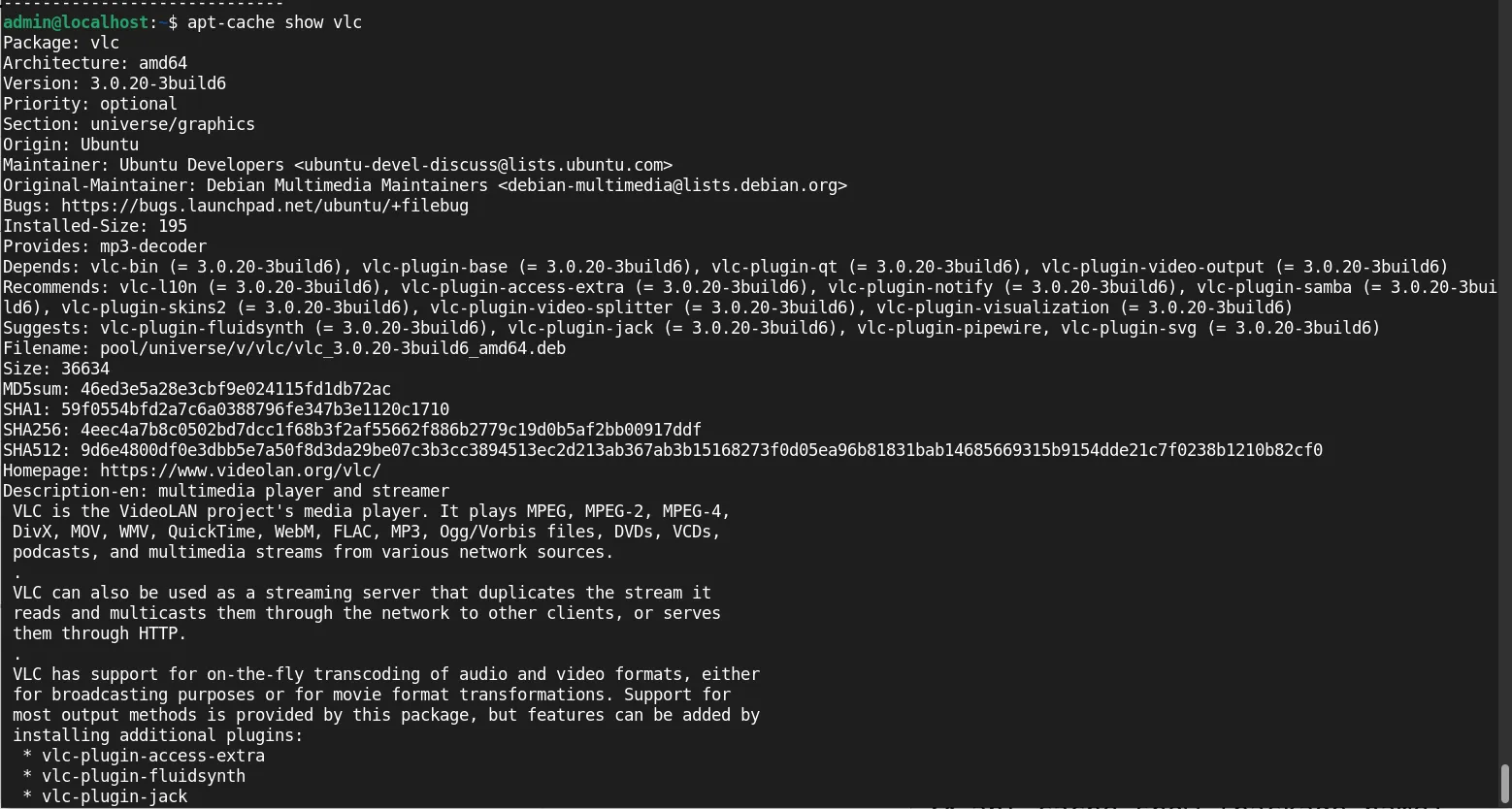
Photo by admingeek from Infotechys
15. |
Purpose: Displays the dependencies of a package.
apt-cache depends vlc
vlc
Depends: vlc-bin
Depends: vlc-plugin-base
Depends: vlc-plugin-qt
Depends: vlc-plugin-video-output
Recommends: vlc-l10n
Recommends: vlc-plugin-access-extra
Recommends: vlc-plugin-notify
Recommends: vlc-plugin-samba
Recommends: vlc-plugin-skins2
Recommends: vlc-plugin-video-splitter
Recommends: vlc-plugin-visualization
Suggests: vlc-plugin-fluidsynth
Suggests: vlc-plugin-jack
Suggests: vlc-plugin-pipewire
Suggests: vlc-plugin-svg
This command is helpful for understanding which packages and libraries a particular software package depends on.
16. |
Displays a list of packages that depend on a specific package.
apt-cache rdepends vlc
Use this command to find out what other packages require the package you are interested in.
17. |
Prevents a package from being upgraded.
sudo apt-mark hold firefox
This command is useful when you want to stop a package from being upgraded automatically, especially if a new version introduces issues.
18. |
Reverses the hold, allowing the package to be upgraded again.
sudo apt-mark unhold firefox
This is used after you’ve previously held a package and now want it to be upgradable again.
19. |
Upgrades the system by installing new packages and removing obsolete ones.
sudo apt-get dist-upgrade
While apt full-upgrade does a similar job, apt-get dist-upgrade is more commonly used in Debian-based systems. It’s effective for upgrading the entire system.
20. |
Clears out the local repository of retrieved package files.
sudo apt clean
This command deletes all cached package files, freeing up space in your system. Use it when your cache becomes too large.
21. |
Removes outdated package files from the cache.
sudo apt autoclean
Unlike apt clean, this command only removes the older versions of packages that are no longer installable.
22. |
Checks the system for broken dependencies and packages.
sudo apt-get check
Use this command to diagnose issues with package dependencies or corrupted installations.
23. |
Adds a public key for package authentication.
sudo apt-key adv --keyserver keyserver.ubuntu.com --recv-keys 0x12345678
If you’re using third-party repositories, this command is useful to ensure that your system can authenticate packages from that repository.
24. |
Downloads the source code of a package.
sudo apt-get source vlc
Reading package lists... Done
E: You must put some 'deb-src' URIs in your sources.list
Use this command to download the source code of a package for compiling or inspecting it.
Note: To enable the necessary package repositories for downloading, you will need to update your sources.list file and uncomment the deb-src entries.
25. |
Upgrades the system and installs new packages that are required by upgrades.
sudo apt-get upgrade --with-new-pkgs
Reading package lists... Done
Building dependency tree... Done
Reading state information... Done
Calculating upgrade... Done
...
This command allows you to install new packages that might be required during an upgrade, providing a more complete system upgrade.
Mastering the apt command suite is essential for every Ubuntu or Debian user. From installing and upgrading software to cleaning up your system, these 25 commands will help you become more efficient and in control of your Linux environment.
As you grow more comfortable using the command line, these commands will enable you to take full advantage of Ubuntu and Debian’s package management system, keeping your system clean, secure, and optimized.
Did you find this article useful? Your feedback is invaluable to us! Please feel free to share this post!

Discover 30 essential PostgreSQL commands to enhance your database management skills. This comprehensive guide covers key commands, examples, and tips for efficient PostgreSQL use. Perfect
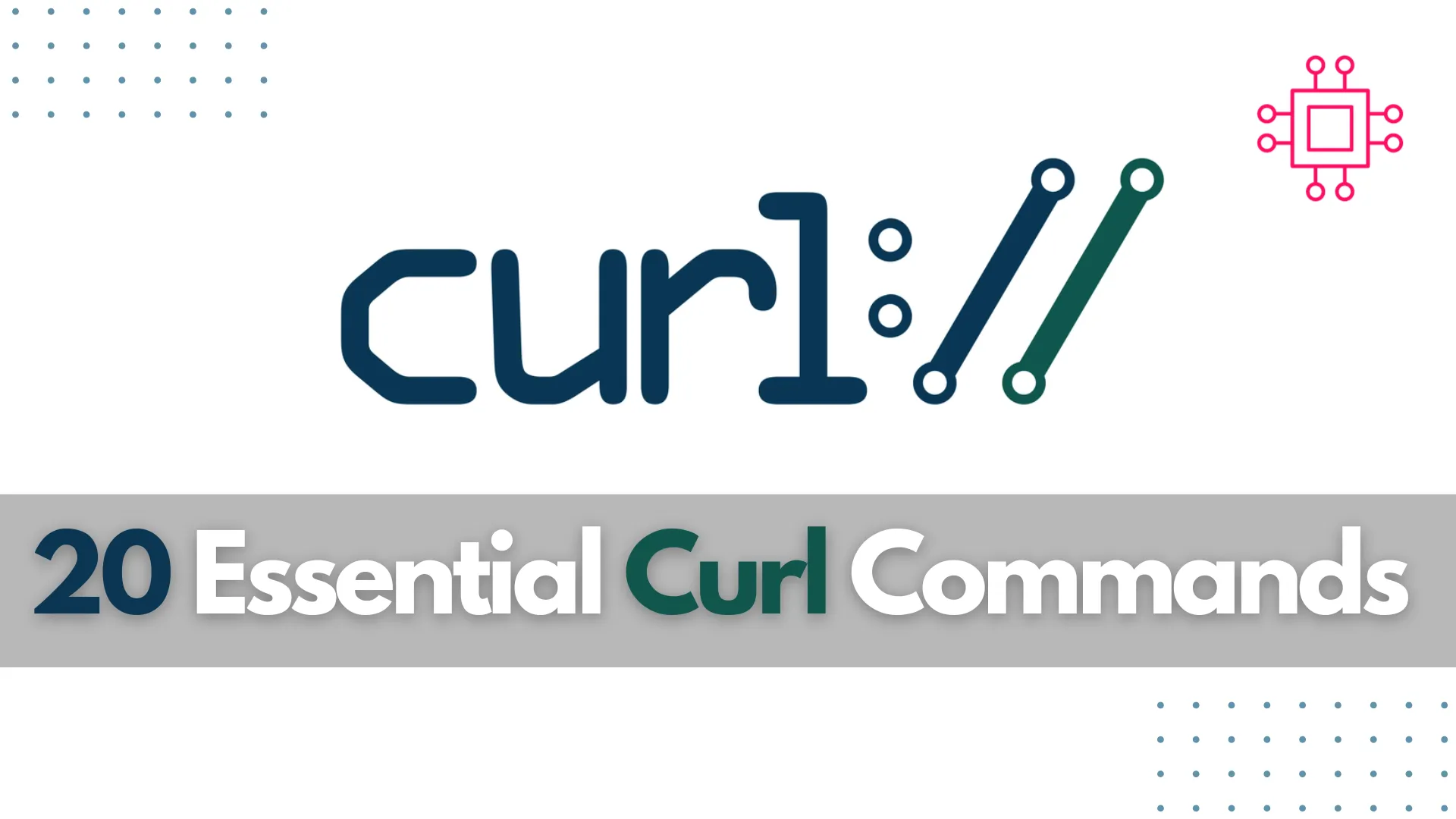
Explore 20 essential curl commands for developers and sysadmins. From GET requests to file uploads and HTTP headers, this guide covers practical examples to enhance
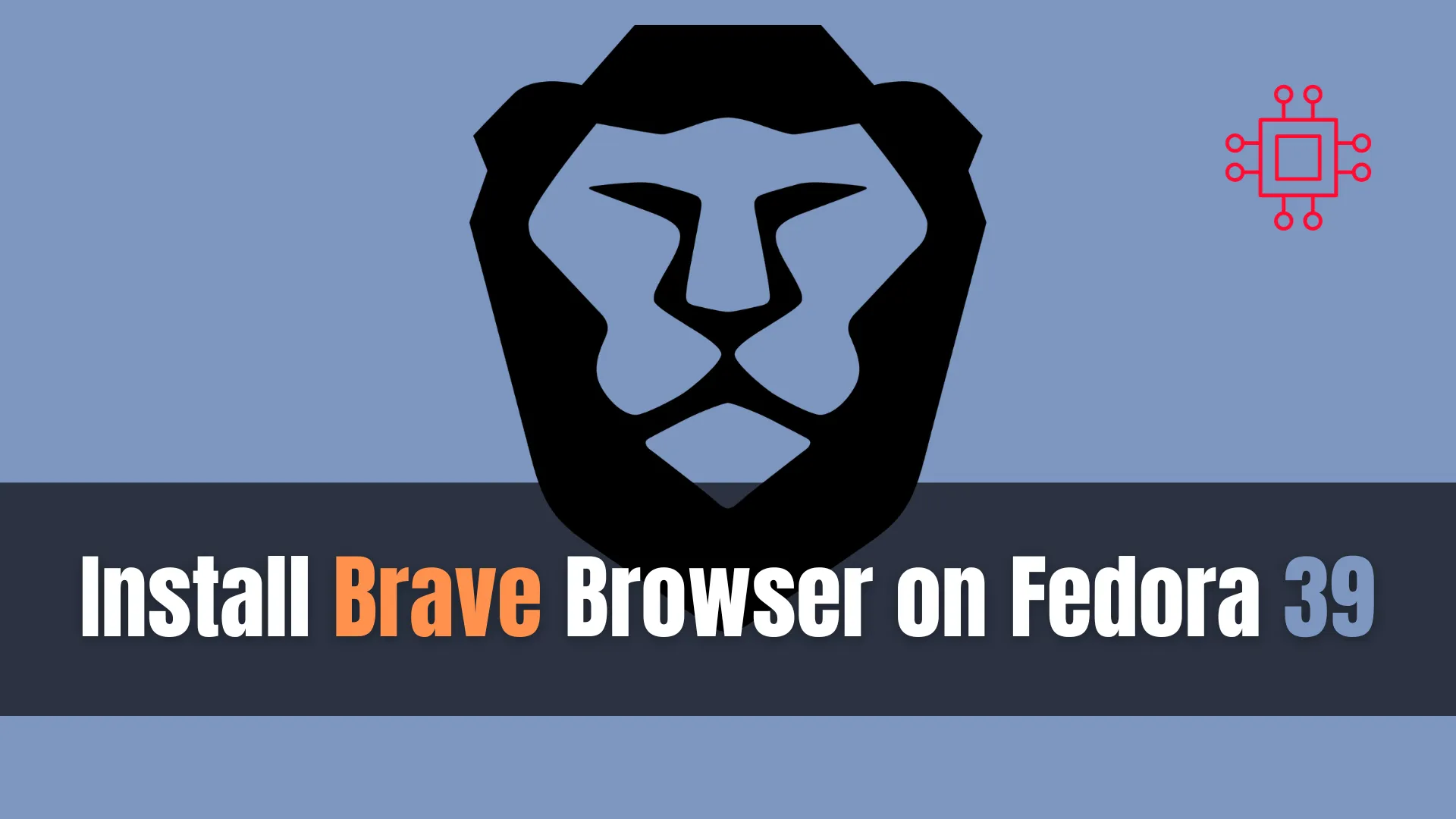
This article delves into how to install Brave Browser on Fedora 39, ensuring you can surf the web with confidence and efficiency. Table of Contents
